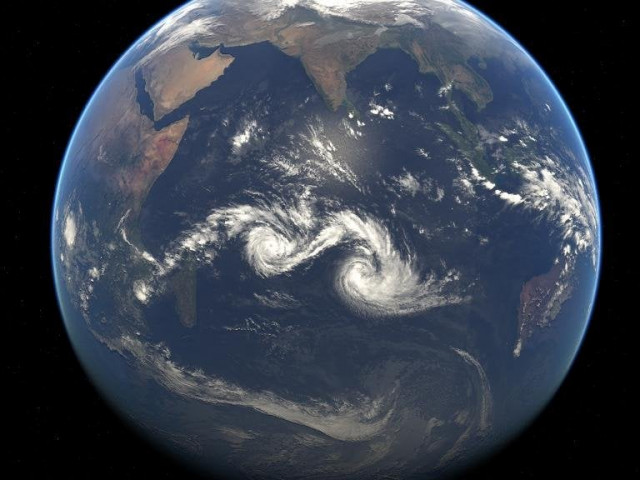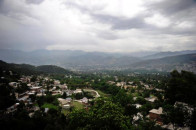Looming threat: ‘Climate change will leave Pakistan wetter’
Report assessing impact of climate changed launched.

“Human activities are contributing more to climate change than natural phenomenon.” PHOTO: AFP
Asia experienced the most weather and climate-related disasters in the world between 2000 and 2008, says the fifth assessment report of the International Panel for Climate Change’s (IPCC). It says the region also suffered the second highest proportion of global economic losses.
The report was launched on Tuesday at a ceremony organised by the IPCC, the Leadership for Environment and Development (LEAD), the Climate and Development Knowledge Network (CDKN) and the Urban Unit.
It includes data of various scientific researches on climate change. The report states that global climate is getting warmer beyond reasonable doubt.
At the launch of the report, a researcher from each of the three working panels that collaborated with the IPCC was present to explain implications of the research.
Edvin Aldrian, from the working group studying the physical science basis, said the research showed a correlation between increase in wealth and pollution.
He cited the ‘Bali experiment’ in Indonesia where he said a significant reduction in carbon dioxide level was observed after no carbon-related human activity was carried out in the area for 30 hours.
“Human activities are contributing more to climate change than natural phenomenon.” He said Pakistan would experience more wet weather conditions than dry as a result of climate change.
Mohsin Iqbal, from the second working group, discussed the impact of climate change, adaptation and vulnerability. He focused on the impact of climate change in Pakistan saying that the Northern Areas would experience higher temperature than southern parts.
“Contrast in dry and wet weather will increase… there will be prolonged periods of drought and rainfall occurring at the same time.” He said rainfall trends in the region would become more uncertain as the magnitude of ‘extreme rain’ would increase.
Iqbal said thawing of snow in Karakoram’s permafrost areas (places that are frozen for more than two consecutive years) was a proof of climate change. Wheat, maize, rice and potato are among the crops most vulnerable to climate change, he said.
Joyashree Roy, the lead author for working group III, discussed climate change-related mitigation. She said industries should look for alternatives to produce low-carbon electricity. Clustering small and medium enterprises together would help make them more energy efficient, she said.
Roy said products should be designed in a way that they lasted longer and were easier to recycle. Chief Meteorologist Ghulam Rasul spoke about the changing rainfall cycle and its impact on agricultural trends. Citing recurring floods in the country over the last five years, he complained about the lack of timely policymaking to deal with climate change.
Planning and Development Board Chairman Muhammad Irfan Elahi stressed the need for more research on climate change. He praised the IPCC for its research. The study would prove crucial in understanding the risks associated with “human- induced climate change”, he said.
Employees of the Planning and Development Department and representatives of various universities and organisations studying climate change attended the report launch.
Published in The Express Tribune, February 25th, 2015.



















COMMENTS
Comments are moderated and generally will be posted if they are on-topic and not abusive.
For more information, please see our Comments FAQ